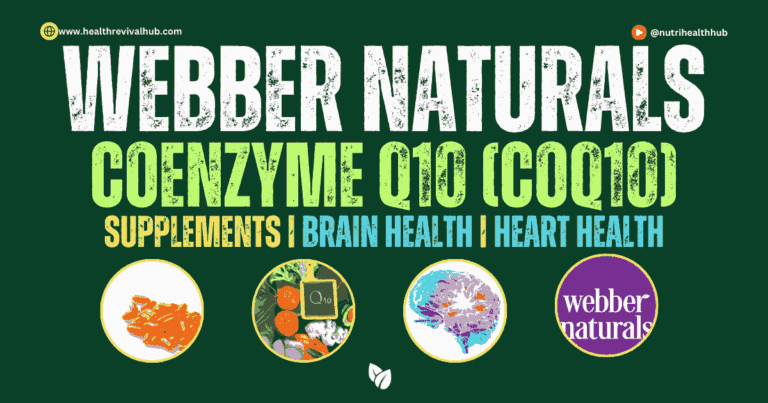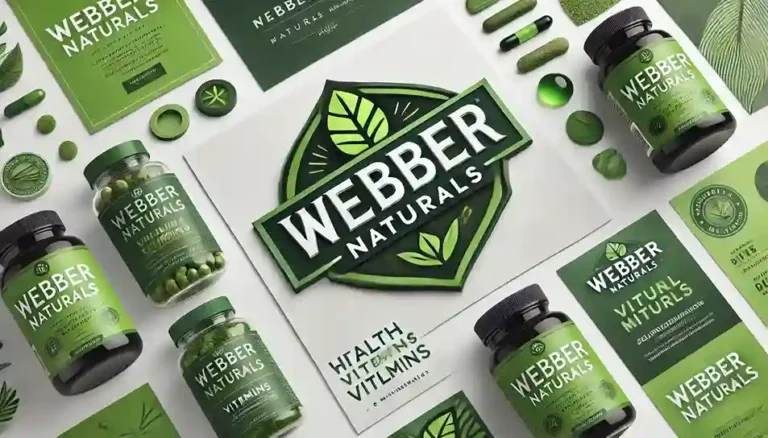Top CoQ-10 Supplements:
#1-Webber Naturals Co Enzyme Q10 100mg: https://webbernaturals.com/products/coenzyme-q10-100-mg?ref=02021981
#2-Nordic Naturals CoQ10 Gummies | 100 Mg Ubiquinol CoQ10 Supplement: https://amzn.to/3xT34Yc
#3-Nature’s Bounty Co Q-10 200 mg, 60 Gummies: https://amzn.to/49EKkZL
#4-HERBAGENIX Coq10 Coenzyme Q10 300mg: https://amzn.to/3W5mm72
Introduction:Coenzyme Q10 (CoQ10)
Yes, it’s true that Coenzyme Q10 (CoQ10) has gained popularity as a supplement for promoting a healthy lifestyle and aging process, and for good reason. Coenzyme Q10 (CoQ10) is a naturally occurring antioxidant and energy producer found in nearly every cell of the body. It plays a crucial role in the electron transport chain, a process that generates energy in the mitochondria of our cells, powering various organs such as muscles, heart, kidneys, liver, and brain, among others.
Additionally, Coenzyme Q10 (CoQ10) scavenges harmful free radicals, contributing significantly to antioxidant status and overall health and vitality.
While the body is capable of producing Coenzyme Q10 (CoQ10) its production naturally declines with age, and certain medications can further inhibit its synthesis, leading to decreased levels in the body. Supplementation with CoQ10 becomes important to replenish declining levels and support overall health and vitality, especially in older individuals. Here are some benefits of CoQ10 supplementation:[1],[2]
Benefits of Coenzyme Q10 (CoQ10)
Healthy Aging:
Declining CoQ10 production and increased oxidative stress are common factors in age-related health issues. Supplementing with CoQ10 becomes particularly important for older individuals to replenish declining levels and support overall health and vitality.[3]
Heart Health:
CoQ10 is highly concentrated in organs with high energy requirements, such as the heart. It supports heart health by aiding in energy production and acting as an antioxidant to protect the heart from damage. CoQ10 also inhibits the oxidation of blood lipids, helping to prevent damage to blood vessels.[4]
Brain Health:
The brain heavily relies on cellular energy and antioxidant protection, and CoQ10 plays a vital role in this process. It is present in brain neurons and protective glial cells, supporting overall brain health.[5]
Skin Health:
CoQ10 protects the skin from oxidative damage, but its levels decline with age. Evidence suggests that CoQ10 acts as an antioxidant, protecting the skin from UV damage and loss of elasticity. Clinical studies have shown improvements in skin thickness, smoothness, and reduction in eye wrinkles with CoQ10 supplementation.[6]
Migraine Prevention:
Some migraine sufferers have reported relief with CoQ10 supplementation. Regular intake of CoQ10 can help reduce the frequency of migraines and associated symptoms. Studies have shown that CoQ10 supplementation led to a significant reduction in migraine frequency in some patients.[7]
While the exact mechanism of CoQ10’s effectiveness in preventing migraines is not fully understood, it is known that many migraine sufferers have lower blood coenzyme levels compared to those who do not experience migraines. Overall, CoQ10 supplementation offers a range of potential health benefits, supporting various aspects of health and well-Being.[8]
CoQ10 in Food:
CoQ10 is found naturally in various foods, contributing to overall dietary intake. Some excellent food sources of CoQ10 include:[9],[10]
- Organ meats such as liver and heart: Approximately 3-11 mg/100 g
- Fatty fish like salmon and sardines: Roughly 0.5-6 mg/100 g
- Meats like beef, pork, and chicken: Approximately 1.5-4 mg/100 g
- Soybeans (cooked): Roughly 1.2 mg/100 g
- Peanuts: Around 2.7 mg/100 g
However, the amount of CoQ10 obtained from diet alone is usually not sufficient to meet the body’s optimal requirements. Hence, supplementation becomes crucial.
When selecting a CoQ10 supplement, it’s important to consider the form it comes in. CoQ10 exists in two forms in the body: ubiquinone and ubiquinol. Ubiquinol is considered the more active form as it is the reduced form that the body utilizes more readily. Both forms can raise blood CoQ10 levels, but ubiquinol is often preferred due to its better absorption.
The dosage of the supplement is also a crucial factor, depending on individual health conditions, age, and lifestyle. Supplements come in various potencies ranging from 100 mg to 400 mg per day. Different formulations cater to different needs, such as heart health or migraine prevention.
CoQ10is a fat-soluble compound, so taking it with meals containing healthy fats enhances its absorption. This also helps avoid potential stomach discomfort that some people may experience when taking CoQ10 on an empty stomach. Additionally, CoQ10 can be taken as a single daily dose or divided into multiple doses throughout the day to maintain more stable blood levels.
In summary, incorporating CoQ10-rich foods into your diet is beneficial, but supplementation may be necessary to meet optimal levels, especially considering individual needs and absorption efficiency. It’s important to choose the right form and dosage of CoQ10 supplement and consider taking it with meals containing healthy fats for better absorption and potential stomach comfort.
Webber Naturals Coenzyme Q10 (CoQ10):
Open the capability of Coenzyme Q10, likewise alluded to as ubiquinone, an imperative cell reinforcement supplement that fills in as the stalwart behind energy creation all through your body. CoQ10 is key for keeping up with ideal heart wellbeing and protecting tissues from the unsafe impacts of oxidative pressure. Whether you’re north of 40 and encountering a decrease in CoQ10 levels or focusing on cardiovascular wellbeing, supplementation offers a helpful and compelling means to renew CoQ10 saves.
Our determination of CoQ10 recipes and potencies is painstakingly created to meet your particular necessities, all exemplified in simple to-swallow softgels for consistent mix into your day to day everyday practice. By picking Webber Naturals Coenzyme Q10, you’re finding a way proactive ways to recover your energy and imperativeness.
Experience the thorough advantages of our Coenzyme Q10 supplements:
Upholds solid heart capability by advancing ideal cardiovascular execution.
Lessens the recurrence of headache cerebral pains and related sickness when taken defensively, giving help to people inclined to such inconvenience.
Offers intense cancer prevention agent security against free extreme harm, supporting by and large cell wellbeing and life span.
Recharges CoQ10 levels that normally decline with age, guaranteeing supported essentialness and prosperity.
With Webber Naturals Coenzyme Q10, you’re putting resources into your wellbeing and imperativeness, engaging yourself to make every second count.
Webber Natural Coenzyme Q10 (CoQ10) Supplements.
Unlock the potential of Coenzyme Q10, also known as ubiquinone, a vital antioxidant nutrient that fuels energy production throughout your body. Our premium CoQ10 supplements support heart health, combat oxidative stress, and replenish energy levels, helping you reclaim vitality and thrive with every softgel.
References:
Bhagavan HN, Chopra RK. Coenzyme Q10: Absorption, tissue uptake, metabolism and pharmacokinetics. Free Radical Research. 2006;40(5):445-453. [DOI: 10.1080/10715760600617843]
Garrido-Maraver J, Cordero MD, Oropesa-Avila M, et al. Coenzyme Q10 therapy. Molecular Syndromology. 2014;5(3-4):187-197. [DOI: 10.1159/000362016]
López-Lluch G, del Pozo-Cruz J, Sánchez-Cuesta A, et al. Bioavailability of coenzyme Q10 supplements depends on carrier lipids and solubilization. Nutrition. 2019;57:133-140. [DOI: 10.1016/j.nut.2018.06.012]
National Institutes of Health. Coenzyme Q10: Fact Sheet for Health Professionals. [URL: https://ods.od.nih.gov/factsheets/CoenzymeQ10-HealthProfessional/]
Miles MV, Horn PS, Tang PH, et al. Age-related changes in plasma coenzyme Q10 concentrations and redox state in apparently healthy children and adults. Clinical Chimica Acta. 2004;347(1-2):139-144. [DOI: 10.1016/j.cccn.2004.04.004]
Alehagen U, Johansson P, Björnstedt M, et al. Cardiovascular mortality and N-terminal-proBNP reduced after combined selenium and coenzyme Q10 supplementation: a 5-year prospective randomized double-blind placebo-controlled trial among older Swedish citizens. International Journal of Cardiology. 2013;167(5):1860-1866. [DOI: 10.1016/j.ijcard.2012.04.156]
Fotino AD, Thompson-Paul AM, Bazzano LA. Effect of coenzyme Q10 supplementation on heart failure: a meta-analysis. The American Journal of Clinical Nutrition. 2013;97(2):268-275. [DOI: 10.3945/ajcn.112.040741]
Mancuso M, Orsucci D, Volpi L, et al. Coenzyme Q10 in neuromuscular and neurodegenerative disorders. Current Drug Targets. 2010;11(1):111-121. [DOI: 10.2174/138945010790006853]
Hidalgo-Gutiérrez A, González-Gross M. [Vitamin E, Selenium and Coenzyme Q10: Role as Antioxidants in Aging and Age-Related Diseases]. Nutrición Hospitalaria. 2012;27(4):1119-1130. [DOI: 10.3305/nh.2012.27.4.5898] (Spanish)
Head KA. Natural approaches to prevention and treatment of infections of the lower urinary tract. Alternative Medicine Review. 2008;13(3):227-244. [PMID: 18950249]
Frequently Asked Questions
Coenzyme Q10 (CoQ10) is a naturally occurring antioxidant found in nearly every cell of the body, playing a key role in energy production within the mitochondria. It also helps neutralize harmful free radicals, protecting cells from oxidative stress. CoQ10 levels naturally decline with age, making supplementation vital for maintaining heart health, boosting energy, and supporting overall vitality.
CoQ10 supplementation offers numerous health benefits, including:
Supporting heart health by promoting optimal cardiovascular function.
Reducing the frequency and severity of migraine headaches .
Providing powerful antioxidant protection to combat oxidative stress.
Boosting energy levels and reducing fatigue.
Supporting healthy aging by replenishing declining CoQ10 levels.
Some of the richest food sources of CoQ10 include:
Organ meats (e.g., liver, heart).
Fatty fish (e.g., salmon, sardines, mackerel).
Meats like beef, pork, and chicken.
Plant-based options like soybeans, peanuts, and spinach.
However, dietary intake alone may not provide sufficient CoQ10, especially as we age, making supplements a practical solution.
CoQ10 is fat-soluble, so it’s best absorbed when taken with meals containing healthy fats (e.g., avocado, olive oil, or nuts). For optimal results, you can take it once daily or split the dose into smaller amounts throughout the day to maintain stable blood levels.
CoQ10 is generally safe for most people, with minimal side effects reported. Some individuals may experience mild digestive issues, such as nausea or diarrhea, but these are rare. If you’re taking medications like blood thinners or blood pressure drugs, consult your healthcare provider before starting CoQ10 supplementation to avoid potential interactions.

